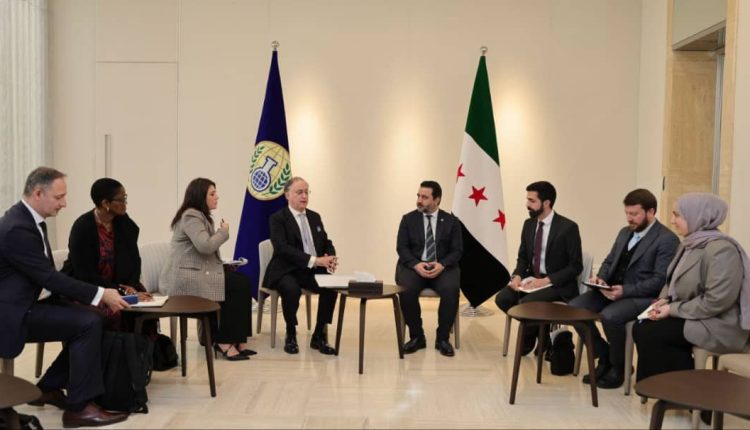OPCW Chief Sees “New Start” in Closing Syria’s Chemical Weapons File
By Kardo Roj
DAMASCUS, Syria (North Press) – The head of the Organisation for the Prohibition of Chemical Weapons (OPCW), Fernando Arias, said Saturday that his visit to Damascus presents an opportunity for a “fresh start” to finally closing Syria’s chemical weapons file after more than a decade of disputes under the now-removed Bashar al-Assad regime.
In an official statement, the Syrian Presidency confirmed that Ahmed al-Sharaa, Syria’s transitional president, and Foreign Minister Asaad al-Shaibani met with an OPCW delegation led by Arias to discuss the future of Syria’s chemical weapons program.
A Turning Point After Years of Deadlock
Arias’ visit marks the first official engagement between the OPCW and Syria’s new transitional government following Assad’s removal on December 8, 2024.
“This visit represents a new beginning,” Arias stated. “After 11 years of obstruction by the previous authorities, the transitional government now has the opportunity to turn the page and fully cooperate in eliminating any remaining chemical weapons concerns.”
Concerns Over Remaining Stockpiles
Following Assad’s ouster, the OPCW formally requested that Syrian authorities secure any remaining stockpiles and facilities linked to chemical weapons. The organization has been in direct contact with Damascus to emphasize the importance of ensuring the safety of such materials.
Arias previously expressed grave concern over potential undeclared stockpiles in Syria. He also warned that recent Israeli airstrikes on military sites—some of which may have been connected to chemical weapons—pose a risk of contamination and loss of critical evidence.
A Long-Standing Issue
The Assad government’s alleged use of chemical weapons has been one of the most controversial aspects of the Syrian conflict. Despite Syria’s formal accession to the Chemical Weapons Convention (CWC) in 2013, the OPCW and UN investigations have accused Damascus of multiple violations, including chemical attacks in Douma, Khan Shaykhun, and Eastern Ghouta.
Since then, OPCW inspectors have faced obstruction and delays from Syrian authorities, leading to years of deadlock in verifying whether the country had truly dismantled all its chemical stockpiles.
Next Steps
Arias stressed that Syria’s full cooperation is essential for the final closure of the chemical weapons file. This includes:
- Providing full access to all sites of interest.
- Ensuring transparency in stockpile declarations.
- Allowing OPCW teams to conduct independent inspections.
The transitional government’s stance on the issue remains cautiously optimistic, with sources indicating that it seeks full normalization with international bodies by addressing lingering concerns over past chemical weapons use.
As the country moves forward from decades of conflict and international isolation, resolving this issue could be a crucial step in Syria’s reengagement with the global community.

